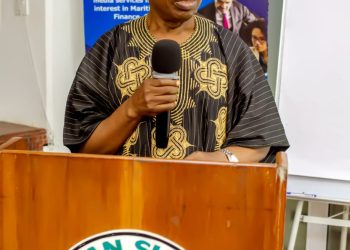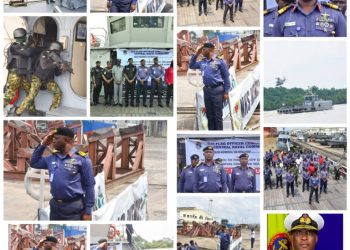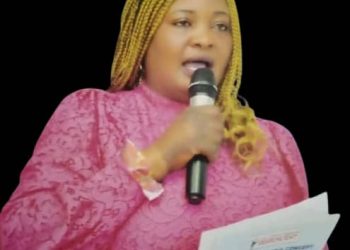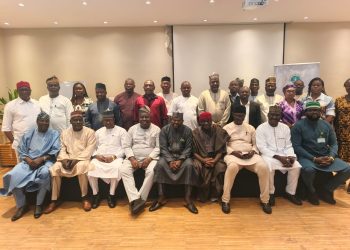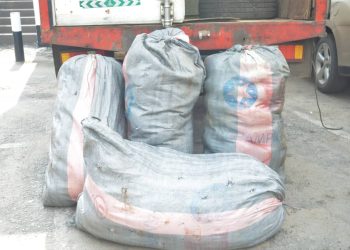- THE CUSTOMS CG HAS ACCOMPLISHED SO MUCH, DESERVES COMMENDATION
— ANIEZECHUKWU
Recently, the Editor- in- Chief of The Prestige Blended Magazine online and Print, Mcanthony Udochukwu Onuoha, engaged the Publicity Secretary of Association of Nigerian Licensed Customs Agents -ANLCA, PTML Chapter, Francis Uchechukwu Aniezechukwu, in an exclusive interview, the seasoned Maritime Practitioner, Researcher and Consultant, had a swell time to speak on the recent ANLCA elections, the CGC’s performance, arbitrary charges and challenges of non- compliance as well as service delivery and other maritime related issues. Enjoy the excerpt!
QUS: SIR, WHAT IS YOUR TAKE ON ANLCA CHAPTER ELECTIONS HELD RECENTLY?
The recent chapter election of the Association of Nigerian Licensed Customs Agents (ANLCA) showcased a largely credible process, highlighting the effectiveness of Mr. Emenike Nwokeoji led NECOM, and that of the Chairman, Board of Trustees, Alhaji Taiwo Mustapha. While there were some skirmishes, particularly in the Apapa Chapter, the swift resolution of these issues reflected strong leadership and efficient governance.
The outcomes saw a mix of wins and losses among candidates, indicating a competitive electoral environment. The integrity of the election process was upheld, reinforcing trust in the association’s leadership. Overall, the event was a testament to the commitment of the electoral body and the association to maintain a fair and orderly election, paving the way for future cooperation and progress within ANLCA.
QUS: CAN YOU MAKE AN APPRAISAL OF THE CURRENT NECOM OF ANLCA?
The current NECOM of the Association of Nigerian Licensed Customs Agents (ANLCA) deserves commendation for its effective management during a challenging transition. Taking over an association marked by years of crisis, they have demonstrated a strong commitment to upholding the constitution and ensuring adherence to its principles.
Their successful organization of both board and chapter elections reflects their dedication to restoring democratic processes within the association. Furthermore, the NECOM has made significant strides in addressing the concerns of agents, fostering a sense of unity and purpose.
Transparency in day-to-day operations has been a hallmark of their leadership, reinforcing trust among members. Overall, the current NECOM’s efforts indicate a positive trajectory for ANLCA, paving the way for stability and future growth in the association.
QUS: HOW WOULD YOU RATE PTML IN SERVICE DELIVERY WHEN COMPARED TO OTHERS?
Well as a researcher, I believe that to provide a comparative analysis of Port and Terminal Multiservices Limited (PTML) with other shipping terminals in Nigeria, we can consider several key performance indicators, such as cargo throughput, operational efficiency, and service quality. Let’s look at this specific statistics for a detailed comparison, this are based on available data:
Key Performance Indicators (KPI) Overview
1. Cargo Throughput:
PTML: Approximately 400,000 TEUs annually.
Apapa Port: Around 1.5 million TEUs.
Tin Can Island Port: About 1.2 million TEUs.
2. Operational Efficiency:
PTML: Average turnaround time of 2-3 days.
Other Terminals: Varies between 5-10 days, with Tin Can often experiencing delays.
3. Service Quality:
PTML: Known for high customer satisfaction ratings, with a focus on efficiency and reduced dwell time.
Other Terminals: Mixed reviews; while some offer good services, issues like congestion and delays are common.
4. Infrastructure:
PTML: Modern facilities with good access to road networks.
Other Terminals: Varying levels of infrastructure; other terminals face congestion issues due to outdated facilities.
While PTML operates at a lower throughput than larger terminals like Apapa and Tin Can, its focus on efficiency, shorter turnaround times, and high service quality make it competitive. The company’s ability to maintain transparency and responsiveness also contributes positively to its reputation within the shipping industry.
QUS: AS A MARITIME PRACTITIONER, HOW WOULD YOU RATE THE CG OF CUSTOMS, HAS HE BEEN ABLE TO MEET SOME OF YOUR EXPECTATIONS ESPECIALLY IN CUSTOMS REFORM?
As a maritime practitioner, the performance of the current Comptoller General of Customs in Nigeria so far, deserves commendation, particularly, in the context of key reforms and initiatives aimed at improving the efficiency and effectiveness of the Nigeria Customs Service with key reforms as:
Implementation of the Customs Modernization Project, aimed at streamlined processes and reduced human interactions.
Enhanced strategies for revenue collection, resulting in increased customs revenue, with significant contributions to national coffers.
Colloboration with other agencies of government that have strengthened anti-smuggling operations with better intelligence gathering, leading to increased seizures of contraband goods.
Focus on training and capacity building for customs officers, which has improved operational efficiency and professional standards within the service.
Given these reforms and the positive impact on operational efficiency, the performance of the current Controller General can be rated as effective. His leadership appears to be steering the NCS towards greater accountability and modernization, which is crucial for the enhancement of the overall performance of customs operations in Nigeria. However, if we compare the impact of revenue generation against trade facilitation within the context of World Trade Organization (WTO) standards, we will see a complex interplay of two essential functions of customs services.
Revenue generation remains a primary function of customs, as it directly contributes to national economies. Efficient customs processes can enhance revenue collection through tariffs and duties.
However, an overemphasis on revenue generation can lead to cumbersome procedures, delays, and corruption, ultimately hindering trade,
While the Controller General has made giant strides in modernizing customs operations, recent skirmishes that relate to projects like B’ ODOGWU highlight areas for improvement, particularly in stakeholders engagement and operational execution. Continuous focus on resolving these issues will be essential for realizing the full benefits of modernization and maintaining trust in the Nigeria Customs Service.
QUS: WHAT EXACTLY CAN YOU SAY IS THE MAJOR CHALLENGE FREIGHT FORWARDERS ARE FACING PRESENTLY?
In my opinion the greatest challenge facing freight forwarders in Nigeria is the absence of a standard regulating agency for freight forwarders in Nigeria, it has significantly impacted the sector in several ways:
1. Lack of Uniform Standards:
Without a regulatory body, there are no standardized practices or guidelines, leading to inconsistencies in service quality and operational procedures among freight forwarders.
2. Increased Competition:
The lack of regulation allows unqualified operators to enter the market, driving down prices but also compromising service quality and safety standards.
3. Difficulties in Dispute Resolution:
The absence of a formal regulatory framework makes it challenging to resolve disputes between freight forwarders and clients or other stakeholders, leading to mistrust.
4. Regulatory Compliance Challenges:
Freight forwarders struggle to navigate the various regulations from different government agencies without a centralized authority to provide clear guidance that will position them as key partners in revenue generation in trade facilitation.
The lack of a standard regulating agency has created an environment that undermines the efficiency, professionalism, and integrity of the freight forwarding sector in Nigeria. Establishing a regulatory authority could enhance standards, promote fair competition, and improve the overall logistics landscape of this Nation.
HOW CAN WE ENSURE THAT SHIPPING COMPANIES AND TERMINAL OPERATORS COMPLY WITH THE LAWS GOVERNING LEVIES AND CHARGES IN NIGERIA?
Transparent Pricing:
Mandate that shipping companies and terminals provide clear and transparent pricing structures, making it easier for stakeholders to understand and challenge any irregular charges.
2. Public Awareness Campaigns:
Increase awareness among importers, exporters, and the public about their rights regarding shipping charges and how to report violations.
3. Penalties for Non-Compliance
Establish clear penalties for violations of pricing regulations, including fines and the suspension of operating licenses for repeated offenders.
By combining these strategies, Nigeria can enhance compliance with laws governing shipping charges, fostering a fairer and more transparent shipping environment.




